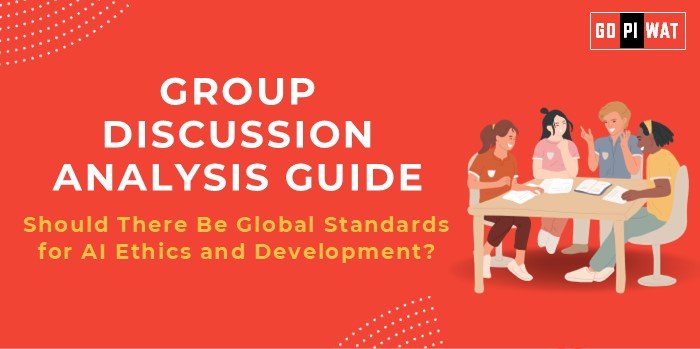📋 GROUP DISCUSSION (GD) ANALYSIS GUIDE
🌐 Topic: Should There Be Global Standards for AI Ethics and Development?
🌟 Introduction to the Topic
Artificial Intelligence (AI) is transforming industries and societies, but its unregulated growth raises ethical concerns ranging from privacy violations to algorithmic bias. The rapid advancement of AI technologies, such as ChatGPT and autonomous vehicles, has triggered global discussions on the need for standardized ethical guidelines to ensure responsible development and deployment.
📊 Quick Facts and Key Statistics
- Global AI market expected to reach $1.8 trillion by 2030 (Source: PwC, 2023).
- 40% of facial recognition systems exhibit racial or gender bias (Source: MIT Media Lab, 2023).
- AI-driven cyberattacks rose by 43% in 2023 (Source: McAfee).
- Only 25% of countries have formal AI ethics frameworks in place (Source: OECD, 2023).
👥 Stakeholders and Their Roles
- Governments: Developing policies to regulate AI ethics and ensure equitable deployment.
- Tech Companies: Innovating responsibly and addressing ethical concerns.
- Citizens: Advocating for privacy, transparency, and fairness.
- International Organizations: Leading the effort to establish global standards (e.g., UNESCO’s AI Ethics Guidelines).
✅ Achievements and Challenges
Achievements:
- AI-powered diagnostics improving early disease detection.
- AI expected to contribute $15.7 trillion to the global economy by 2030 (Source: PwC).
- AI applications aiding in climate modeling and resource management.
Challenges:
- Discrimination in AI algorithms affecting marginalized communities.
- Breaches and misuse of personal data due to weak regulations.
🌍 Global Comparisons:
- EU: Leading with GDPR and the AI Act focusing on transparency.
- China: Balancing innovation with strict government oversight.
🗂 Structured Arguments for Discussion
- Supporting Stance: “Global standards will harmonize AI development, ensuring ethical practices and fostering international trust.”
- Opposing Stance: “Uniform standards may stifle innovation and fail to address region-specific challenges.”
- Balanced Perspective: “While global standards are necessary, they should be adaptable to regional needs and contexts.”
🔑 Effective Discussion Approaches
- Opening Approaches:
- Use a compelling statistic, such as the economic potential of AI or the rise of AI-driven cybersecurity threats.
- Pose a thought-provoking question: “Can we afford to let AI evolve without a unified ethical framework?”
- Counter-Argument Handling:
- Argument: “AI standards will hinder innovation.”
- Rebuttal: “Standardization encourages trust and wider adoption, ultimately benefiting innovation.”
📈 Strategic Analysis of Strengths and Weaknesses
- Strengths: Enhanced global trust, reduced algorithmic bias.
- Weaknesses: Potential delays in innovation, enforcement challenges.
- Opportunities: International collaborations, equitable AI access.
- Threats: Geopolitical rivalries, misuse in surveillance.
📚 Connecting with B-School Applications
- Real-World Applications: Projects on ethical AI in marketing, supply chain management, or HR analytics.
- Sample Interview Questions:
- “How can businesses ensure ethical AI practices without stifling innovation?”
- “What role do global standards play in fostering trust in AI applications?”
- Insights for B-School Students: Understanding ethical AI helps future leaders navigate tech-driven industries responsibly.


